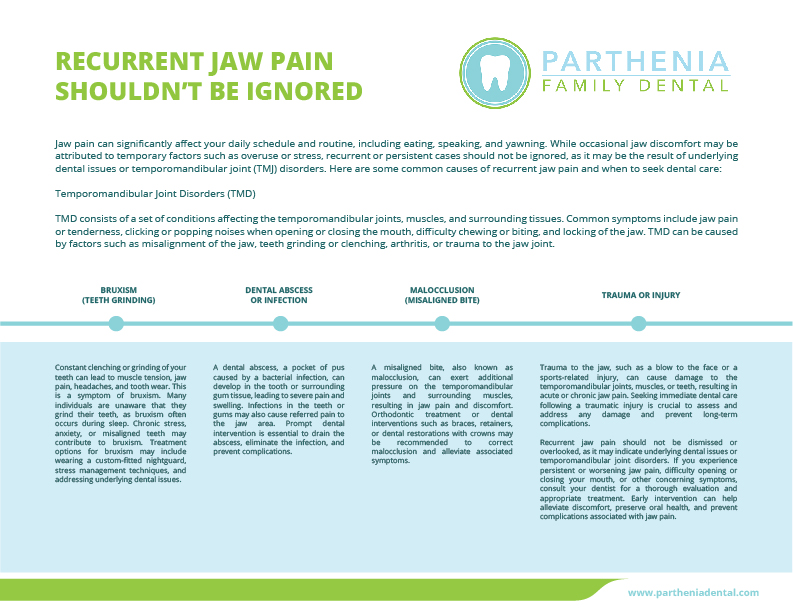
Temporomandibular Joint Disorders (TMD)
TMD consists of a set of conditions affecting the temporomandibular joints, muscles, and surrounding tissues. Common symptoms include jaw pain or tenderness, clicking or popping noises when opening or closing the mouth, difficulty chewing or biting, and locking of the jaw. TMD can be caused by factors such as misalignment of the jaw, teeth grinding or clenching, arthritis, or trauma to the jaw joint.
Bruxism (Teeth Grinding)
Constant clenching or grinding of your teeth can lead to muscle tension, jaw pain, headaches, and tooth wear. This is a symptom of bruxism. Many individuals are unaware that they grind their teeth, as bruxism often occurs during sleep. Chronic stress, anxiety, or misaligned teeth may contribute to bruxism. Treatment options for bruxism may include wearing a custom-fitted nightguard, stress management techniques, and addressing underlying dental issues.
Dental Abscess or Infection
A dental abscess, a pocket of pus caused by a bacterial infection, can develop in the tooth or surrounding gum tissue, leading to severe pain and swelling. Infections in the teeth or gums may also cause referred pain to the jaw area. Prompt dental intervention is essential to drain the abscess, eliminate the infection, and prevent complications.
Malocclusion (Misaligned Bite)
A misaligned bite, also known as malocclusion, can exert additional pressure on the temporomandibular joints and surrounding muscles, resulting in jaw pain and discomfort. Orthodontic treatment or dental interventions such as braces, retainers, or dental restorations with crowns may be recommended to correct malocclusion and alleviate associated symptoms.
Trauma or Injury
Trauma to the jaw, such as a blow to the face or a sports-related injury, can cause damage to the temporomandibular joints, muscles, or teeth, resulting in acute or chronic jaw pain. Seeking immediate dental care following a traumatic injury is crucial to assess and address any damage and prevent long-term complications.
Recurrent jaw pain should not be dismissed or overlooked, as it may indicate underlying dental issues or temporomandibular joint disorders. If you experience persistent or worsening jaw pain, difficulty opening or closing your mouth, or other concerning symptoms, consult your dentist for a thorough evaluation and appropriate treatment. Early intervention can help alleviate discomfort, preserve oral health, and prevent complications which may turn into a dental emergency. Visit Parthenia Family Dental, a dentist accepting Medi-Cal, for your TMJ assessment. 






